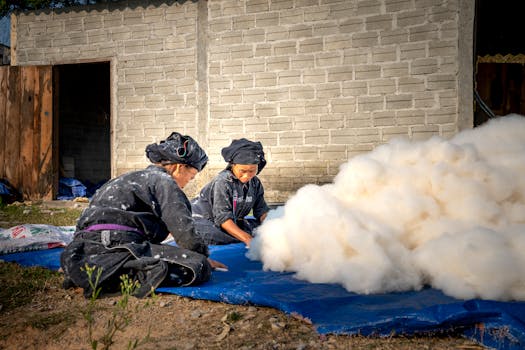
Empowering Communities: The Role of Women in Africa’s Fiber Production
Empowering Communities: The Role of Women in Africa’s Fiber Production is a crucial topic that highlights the significance of women’s contributions to the fiber production industry in Africa. Women in Africa play a vital role in the production of fiber, which is a critical component of the textile and clothing industry. The fiber production industry is a significant sector in Africa, providing employment and income opportunities for millions of people, particularly women.
According to the Food and Agriculture Organization (FAO) of the United Nations, women make up approximately 50% of the agricultural workforce in Africa, and they are responsible for producing over 70% of the continent’s food crops. In addition to their role in food production, women are also involved in the production of other crops, including cotton, flax, and hemp, which are used to produce fiber.
The Importance of Women in Fiber Production
The importance of women in fiber production cannot be overstated. Women are not only involved in the production of fiber but also in the processing and marketing of fiber products. They are responsible for spinning, weaving, and knitting fiber into clothing, textiles, and other products. Women’s involvement in fiber production has helped to promote economic development, reduce poverty, and improve living standards in their communities.
In addition to their economic contributions, women’s involvement in fiber production has also helped to promote sustainable practices. Women are more likely to use environmentally friendly methods of production, such as organic farming and natural dyeing, which helps to reduce the environmental impact of fiber production.
Challenges Faced by Women in Fiber Production
Despite the importance of women in fiber production, they face several challenges that hinder their ability to participate fully in the industry. One of the major challenges faced by women is limited access to resources, including land, credit, and technology. Women often have limited access to land, which makes it difficult for them to produce fiber on a large scale.
Another challenge faced by women is limited access to markets. Women often have limited access to markets, which makes it difficult for them to sell their products. This can lead to low prices and low incomes, which can perpetuate poverty and limit economic development.
Empowering Women in Fiber Production
To empower women in fiber production, it is essential to address the challenges they face. This can be achieved by providing women with access to resources, including land, credit, and technology. Governments and organizations can provide training and support to women to help them improve their productivity and competitiveness.
In addition to providing access to resources, it is also essential to promote women’s participation in decision-making processes. Women should be involved in decision-making processes at all levels, from the local to the national level. This can help to ensure that women’s needs and concerns are taken into account and that policies and programs are designed to support their participation in fiber production.




